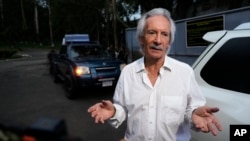Two days after his transfer from prison to house arrest, publisher Jose Ruben Zamora had a visitor: Guatemalan President Bernardo Arevalo.
At the meeting Monday afternoon, Arevalo and Zamora had “an open and frank dialogue with a focus on key issues for the future of the country,” according to the Guatemalan presidency.
Zamora, 67, had been detained on questionable grounds for two years. In 2023, he was sentenced to six years in prison for money laundering. But an appeals court overturned the conviction and ordered a new trial for 2025.
A court on Friday finally ordered Zamora to be released for “human rights reasons” and because the “prison term has exceeded the limits.”
After his release the following day, the journalist said he was “extraordinarily happy for all the support” he had received from fellow journalists and international media watchdogs.
Zamora was arrested in July 2022 after publishing an editorial in his former media outlet El Periodico.
International groups said the accusation of money laundering and other charges leveled at him were in response to his media coverage and reporting on corruption in the government of former president Alejandro Giammattei.
Following the court order, Caoilfhionn Gallagher, the international lawyer who represents the publisher, said in a statement that “Zamora will finally be released but is not yet free.”
“His release is conditional, and he continues to face spurious charges with the risk of a return to prison hanging over him. The Guatemalan authorities must now drop the charges and bring an end to this cruel persecution," said Gallagher, of Doughty Street Chambers in London.
The judge prohibited Zamora from leaving the country and ordered him to report to the prosecutor’s office every week.
He may no longer be in prison, but he still faces legal challenges. Zamora said he will defend himself while under house arrest and deal with other issues.
“I do have to respond to obligations. I owe banks, I have no income, but I have to move forward,” Zamora told a group of journalists moments after his release.
His case brought worldwide attention to the state of press freedom in Guatemala. The country ranks 138 out of 180 on the World Press Freedom Index, where 1 shows the best environment.
Press freedom watchdog Reporters Without Borders, which compiles the index, reports that even though freedom of the press is guaranteed in Guatemala’s constitution, politicians and other government officials violate that right continuously.
Zamora founded El Periodico, an independent media outlet that exposed multiple corruption scandals in Guatemala, in 1996. After his arrest, it closed.
U.S. Assistant Secretary of State for Western Hemisphere Affairs Brian Nichols welcomed Zamora’s release, reaffirming Washington's commitment to defending press freedom in the region.




